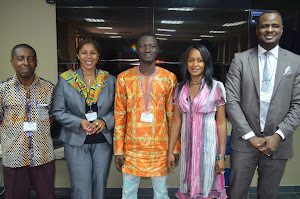BY EDMUND SMITH-ASANTE
 |
| Dr. Steve Manteaw (4th from left), Chair, Steering Committee of the Civil Society Oil & GAs Platform addressing the press |
The Civil Society Platform
on Oil and Gas, has called for a high level forensic probe into the operations
of the Ghana National Gas Company (GNGC), because its establishment and operations
have not followed due process.
Among other things, the
Platform has cited the registration of GNGC as a limited liability company
while funding it 100 percent with money from the state, as incongruous.
At a heavily attended
press conference addressed yesterday, October 18, 2012 in Accra, by Dr. Steve Manteaw,
the Platform’s Chair, the group stated; “The registration of GNGC as a limited
liability company, while funding it 100% with public money, is in our view an
anomaly that makes it difficult for the exercise for the kind of public
oversight that are the norm with public companies such as the Volta River
Authority, the Ghana National Petroleum Company, Electricity Company of Ghana
etc.”
In a seven point concern
tabled in a statement issued at the Press meet, the Platform also expressed
worry that the gas infrastructure project currently underway has not been
approved by Parliament, while an Environmental and Social Impact Assessment
required for projects of this nature is yet to be complied with.
Other concerns conveyed
were that because the company was established by the presidency without recourse
to the sector ministry, it undermines the authority of the ministry, adding
that they view it as improper for Dr. Kwesi Botchwey and Dr. Sipa Yankey, who
worked on the feasibility and road map to developing Ghana’s gas resource, to
have benefited from their report to the President, by their appointment to the
company that emerged as part of the implementation of their recommendations.
Also of utmost concern
to the Civil Society Platform is the fact that although the 2012 budget and
economic policy statement of the Republic of Ghana estimates that the country
loses about $36 million annually through transfer pricing, for which reason
Ghana with support from the EU has developed new rules, SINOPEC, a Chinese
company working on Ghana’s gas infrastructure has been able to inflate its
purchases from a related company.
“We are concerned about
the relatively high cost and low liquid recovery of the gas plant being
procured for the project,” the Platform capped its list of concerns.
According to them, the
Sinopec International Petroleum Services Corporation (SIPSC) is delivering a
processing plant that will cost $40 million more than another plant which is
considered superior by virtue of having five additional features, including
specifications that are favourable to the Volta River Authority (VRA).
“Various simulations
indicate, for instance, that the ‘superior’ plant would yield additional
revenues in excess of $100 million every year, translating to about $360,000
per day,” the Platform disclosed, saying “In addition, the 45-kilometre shallow
water pipelines to be installed by SIPSC will cost about $1.6 million more per
kilometre than the deep water pipeline installed by the Ghana National
Petroleum Corporation (GNPC) despite the shallow water pipelines not meeting
the technical requirement of having internal coating.”
In view of the forgone,
the Platform has placed a five-point demand on government, starting with the
forensic investigation into the GNGC’s operations. “We make this demand because
of the huge costs being recorded relative to the gas project and their
ramifications for gas pricing when the project is completed,” the group
advanced.
Ghana’s projected price of delivered gas to Takoradi
is put at $5.9 per MBtu according to a study by the African Centre for Energy
Policy (ACEP), while it is estimated that per SINOPEC’s operations the price of
delivered gas will be raised higher, thereby “making Ghana’s Jubilee gas not
only uncompetitive, but also uneconomical to industrial consumers who will be
unjustifiably denied cheaper source of energy than what the West Africa Gas
Pipeline Company offers – currently at $6 per MBtu.”
The Platform also
demands that the President gathers the political courage to deal with those
that may be found culpable of any impropriety at Ghana Gas and that the company
be restricted as a subsidiary of the Ghana National Petroleum Corporation under
the Ministry of Energy’s oversight.
It also insists that
Parliament takes immediate steps to call for the GNGC-SINOPEC deal to be laid
before it for debate and possible ratification in order to streamline the GNGC’s
activities, while the Environmental Protection Agency (EPA), must take steps to
make Ghana Gas comply with its regulations on Environmental and Social Impact
Assessment.











